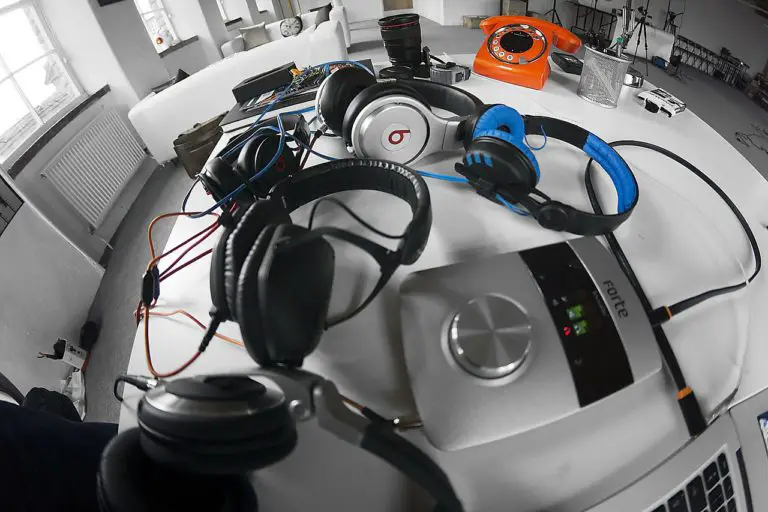Why Do Vinyl Records Crackle?
A little bit of vinyl crackling can’t be a bad thing, no other recording technology has lasted this long. First, it was vinyl vs. 8-Track, then it was vinyl vs. cassette and then it became vinyl vs. CD. As if nothing has changed, the age-old debate rages on— what sounds better, vinyl, or digital?
Whatever the reason, people don’t seem to grow tired of this once revolutionary recording technology. Some people love the perfection and detail of modern recording equipment. Others prefer the simplicity of vinyl, opting for a more “authentic” sound. Whether you love it or hate it, those crackling and popping sounds that vinyl records produce are not simply due to “old-timey” recording equipment and outdated technology.
So, just why do vinyl records crackle, you ask? Crackling generally occurs when microscopic debris, trapped between the grooves of the record, rubs against the turntable needle, which then amplifies and produces sharp crackling and popping sounds.
What causes those vinyl records to crackle? While the cracking may actually blend in with the music, in most cases it is more of an annoying feature that most people don’t know how to get rid of. This article will explain the cause of that crackling sound as well as give ways to get rid of it.
With heavy metal records from all generations and genres being prized possessions, it’s time we take a closer look at technology — what makes it crackle and pop and how can we take care of it?
What can be done to limit crackling?
Some cheap forms of vinyl also tend to conduct high rates of static electricity, contributing to crackling. As Occam’s razor predicts, sometimes the simplest solution proves best: old or damaged turntable needles can increase vinyl crackling—it simply may be time to replace your needle.
Yet another cause of the dreaded crackling sound is that of static electricity. You know that sound that your clothes sometimes make when you pull them out of the dryer? This can be caused by the friction being built up between the needle and the vinyl groove.
The static build-up can be caused by humidity. So you probably would not have an issue with static electricity in drier climates. In more humid ones you could open a window while you play the record; or invest in a humidifier.
Some other solutions to reduce static build-up is to get a cork mat or an anti-static sleeve to replace the cardboard sleeve the record usually comes in. These sleeves won’t break the bank too much since they come in batches of 25-50.
In moderation, a little bit of crackling can be a good thing, with a lot of people actually preferring it. Now that we know what causes our favorite vinyl to crackle, what can be done about it?
Keep An Eye Out For These Faults When Buying New Vinyl
Even though we live in a time where music can essentially be downloaded for free, more and more metal fans are switching to Vinyl to rock out in a more “premium” fashion.
Although brand new, there are still some common faults, typical with new vinyl, that need to be addressed, including:
- Vinyl Material Quality: The main cause of most crackling records is simply because it is made out of impure or cheap vinyl, or even recycled vinyl. These impurities can create noise and static when played. For smoother playing sound, you should use virgin vinyl or 180-gram vinyl.
- Warped Records: Improper storage at the production facility or retail store can lead to a warped purchase. In minor cases, this won’t really have an effect on your vinyl but in more extreme cases, warping can lead to skipping and tracking errors. Should you be unfortunate to purchase a warped record, be sure to send it back and ask for a refund.
- Surface bubbles on newly purchased vinyl: As this fault is visible with the naked eye, if making your purchase from a retail store, be sure to inspect the record for any of these nasty surface bubbles as they tend to create loud thudding noises when the needle passes over them.
- Off-Center Pressing: This is perhaps the cardinal sin of record faults. When the spindle hole is not central to the stamped grooves in the vinyl, an off-center pressing error has occurred. This manufacturing, calibration error can cause speed discrepancies, which lead to flutter pitch drift on long, drawn-out chords and notes.
- Excessive surface noise: Surface contamination straight from the production factory is not at all uncommon; thankfully it’s an easy fix that doesn’t require returning your purchase. Simply follow the cleaning steps listed above and give your new album a good wet clean, to remove any factory dust and debris before listening.
Check out this video for some detailed information on cleaning and caring for your vinyl:
Cleaning steps for Vinyl Records
Vinyl crackling becoming a little too much lately? Sounds like it’s time to get cleaning. Follow these steps to restore your favorite albums and have them sounding like new.
- Inspect the record for visible blemishes: Use a bright light to spot and take note of any discolorations, fingerprints or smudges, as these will be the areas you will need to pay special attention to.
- Use a vinyl record brush to eliminate dust and static: Just as you would sweep before mopping, before using a liquid cleaning solution, use your vinyl brush to gently brush away any debris —seen and unseen— without harming the surface of the vinyl.
- Spray cleaning solution on any problem areas: Once you have identified any areas that require special attention, directly apply your chosen cleaning solution. Do your best to avoid soaking or splashing your record labels as this can cause them to discolor and/or peel. Click here for some detailed advice on homemade cleaning solutions.
- Wipe away any blemishes or fingerprints: Once you have applied your cleaning solution to the surface of the vinyl, use a cotton cloth and apply pressure in a circular motion to remove any blemishes. Again—be sure to avoid the labels.
- Rinse and dry the record: This next step requires some precision. Using a spray bottle filled with water, carefully spray and wash away any remaining cleaning solution. Afterward, be sure to use a clean cloth, different from the one used to remove blemishes, to dry your vinyl before placing it back in its casing.
- Be sure to store your vinyl properly to limit future cleaning: Do your best to keep your records in their original sleeves and casings and when it’s time to take them out for listening, handle them by the edges or labels.
—Here is a great article that details the best vinyl storage methods.
Can VInyl Records Stand The Test Of Time?
As with anything else, as long as there is the demand for a product there is always a market. The market for vinyl records is mostly a collector’s market with people who are into antiques. Online forums and trading sites like Ebay or Discogs still have an active community of avid collectors paying tens of thousands to get valuable variants.
The mechanics that went into analog recording actually created a more unique and original sound that CDs and online streaming can’t really capture. Add that to the nostalgic feeling that vinyl records create; along with the simplicity that went into the creation of the vinyl record.
According to Rolling Stone, 2019 was the first year vinyl was poised to outsell CDs since 1986.
Conclusion
If vinyl is your thing, chances are you enjoy a little bit of background crackling. However, if that crackling begins to take away from your listening experience, it probably means it’s time for a good cleaning.
To get rid of that cracking sound and achieve a more pure sound, then it all boils down to taking care of your vinyl record collection and keeping it clean. Always make sure your hands are clean and definitely never sit anything down on it. Lastly, if you want to give it that brand new look, give it a good wipe down every once in a while.
Thankfully, now that you know what to do, you can quickly get back to rocking out.
Keep it on Bythebarricade.com for tons of punk rock interviews, reviews, articles, and photos! Also, “Like” By the Barricade on Facebook to never miss a post.








